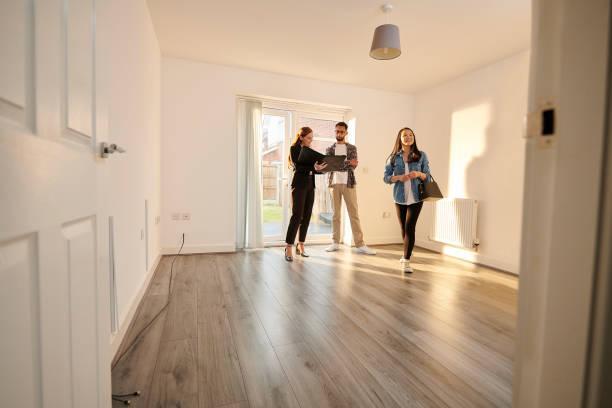If you are looking to rent a house or a flat for the first time then you are entering a very exciting phase of your life! You might be moving out of your parent’s home, or you might have finished university and want somewhere more professional to live before you begin your new career. No matter what the reason for renting for the first time is, as much as it is exciting, it can also be overwhelming when you first start to look.
There is a lot to consider and to be aware of, but we’ve put together a helpful guide and a list of rental tips for beginners that will take you through everything that you need to know.

Top 10 Tips for First-Time Tenants?
1. Know what you are looking for
There are hundreds of rental properties on the market, and they come in all different shapes and sizes. Try to narrow down your search by having a few things in your mind before you start looking, including.
- Location – where do you want to live? Many estate agents will have area searches to make this easier for you
- Do you want the property furnished (all furniture included) or unfurnished (no furniture included, sometimes white appliances like fridges will be included)
- When do you want to move? Usually, landlords will want you to move within a month of the property becoming available.
- How long do you want to rent for? Some minimum-term contracts can vary
2. Know your budget
Before you start your search, it is good to have a monthly budget in mind. There is no point in finding your perfect home and then realising it is far too expensive to live there! It is also important to keep a few other bills in mind, including utility bills, council tax, insurance etc as these will affect your monthly budget.
3. Arrange the viewings:
You should never apply for a property without viewing it! You need to make sure that it is right for you before signing your agreement. When you are arranging viewings with your letting agent in London, you need to keep in mind the below.
- Book in advance – if the property is tenanted, they will need at least 24 hours’ notice before your viewing.
- Saturday viewings are popular so it may take longer to secure a Saturday viewing.
- Ask questions about the property and the area, especially if the current tenant is at home!
4. Find out what is included in the agreement
Furnished properties should come with everything included, especially large items such as fridges, freezers, beds, sofas and wardrobes. Many, but not all, unfurnished properties will come with kitchen appliances, but you need to be sure of what is provided before you move it. Ask to see a current inventory list, and check before you apply for the property what is included if it is unclear.

5. How much will it cost you to move in?
Before you move it, it is important that you clarify how much money is required upfront. You will need to pay the deposit and usually, you will need to pay some rent upfront to secure your spot. The landlord will happily work this out for you so you know exactly where you stand before you sign any agreements.
6. Have all the necessary information ready
When you first apply for a property, you will be faced with a mammoth application form. It will help to have all the necessary information ready to make the process smoother and easier! You will need to have to hand.
- Your photo ID
- Proof of current address
- Evidence of your income and a potential work reference
- In certain cases, a guarantee to guarantee your rent payments
7. Who manages the property?
It is important to understand who manages your property as this will determine who you will correspond with during the time you are renting. It could be directly with the landlord if it is a private rental, or it could be with a letting agent in Lewisham if it is managed by a company. It is important that you have their contact details to hand if you ever need to report anything or clarify anything.
8. Make sure it is suitable
Some landlords will have certain requirements or restrictions for their property, and it is important that you understand this before signing the contract. For example, some landlords won’t allow a poor credit history or pets, and you need to check this before arranging a viewing.
9. Organise internet
Once you have signed the agreement you can start to get excited! One of the first things that you need to organise is your internet, as appointments for new properties can take up to 3 weeks sometimes! To save you from waiting once you have moved in, get the appointment booked as soon as you can.
10. Arrange for suitable insurance
While landlords are responsible for arranging insurance for the building, it is up to you to arrange insurance for the contents inside. This will help to protect you from natural events such as floods, and any robberies that might happen. It is easy to forget, but it will cost you a whole lot of money and hassle if you don’t take any insurance out!

Know your rights and responsibilities as a tenant
As soon as you move into your first rental home, you will have certain rights as a tenant, as well as certain responsibilities that you need to uphold during the time that you live in the property. The contract that you sign before receiving your keys will outline the expectations of both you and your landlord, but we have put the general rights and responsibilities below so that you know what you have to do before you sign anything.
Your Rights
- Have your deposit protected in an approved deposit protection scheme so you don’t have to worry about fighting to get it back at the end of the tenancy
- Be protected from unfair eviction and rental increases
- Get your deposit back at the end of your tenancy, as long as you meet your responsibilities as a tenant
- Live in a property that is safe and in a good state of repair
- Quiet enjoyment – the landlord must give you 24 hours of notice before visiting (even for regular inspections) unless there is an emergency
Your Responsibilities
As a tenant, your responsibilities include:
- Taking care to avoid damaging the property, even accidentally!
- Paying the rent on time and in full
- Paying all other bills correctly and on time
- Paying for any damage that was caused by you or your guests
- Allow your landlord to conduct property inspections and do any maintenance work, providing they give you enough notice
- Not sub-letting the property unless agreed before signing and it is in your agreement
- Reporting any problems with the property to the landlord in good time so they can arrange for these problems to be fixed (i.e., mould, damp, broken windows)
We hope that our rental tips for beginners have helped with your search! If you have any other questions or queries, or you would like to arrange any property viewings then get in touch with our friendly team today! We are happy to help.
Frequently Asked Questions (FAQs)
What should I know when renting for the first time?
Start by setting a budget, deciding on location and contract length, and preparing necessary documents.
What documents do first-time renters need?
Photo ID, proof of address, income verification, and possibly a guarantor’s information.
Are there tips for first-time renters in the UK?
Yes—budget wisely, clarify furnishings, understand your rights, and secure contents insurance.
What if I have a pet or poor credit?
Always check the landlord’s restrictions before signing. Some may not allow pets or poor credit history.
Who should I contact for property issues?
Check whether your property is managed by a letting agent or private landlord and keep their contact details handy.
How do I prepare for moving in?
Arrange your internet, utilities, and insurance as soon as your agreement is signed.
What is contents insurance and why do I need it?
It covers your personal belongings against theft, fire, or other damage. It’s not included in the landlord’s insurance.
What are my responsibilities as a tenant?
Paying rent, reporting problems, avoiding damage, and allowing access for inspections.
What should first-time landlords know?
Focus on legal compliance, communication, and consider using a professional letting agency.
How can I make my rental experience easier?
Stay organised, communicate clearly, and work with a reputable agent.